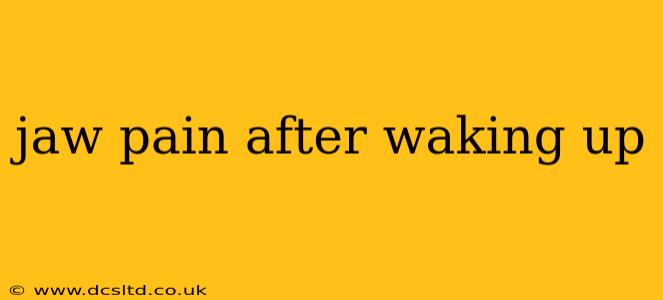Waking up with jaw pain can be incredibly frustrating and disruptive. This discomfort, often experienced as stiffness, aching, or even sharp pain, can significantly impact your daily routine. Understanding the potential causes is the first step towards finding relief. This comprehensive guide explores the common reasons behind morning jaw pain, effective treatment options, and preventative measures to help you wake up pain-free.
What Causes Jaw Pain After Waking Up?
Several factors can contribute to jaw pain upon waking. Often, it's related to how you sleep or underlying medical conditions. Let's delve into some of the most frequent culprits:
-
Temporomandibular Joint (TMJ) Disorders: TMJ disorders are a primary cause of jaw pain. These conditions affect the temporomandibular joints, which connect your jaw to your skull. Symptoms can range from mild discomfort to severe pain, often worsened by chewing, yawning, or opening your mouth wide. TMJ disorders can stem from various factors, including teeth grinding (bruxism), clenching, arthritis, or injury.
-
Teeth Grinding (Bruxism): Many people grind their teeth unconsciously, especially during sleep. This repetitive action puts significant strain on the jaw muscles and joints, leading to morning stiffness and pain. Stress, anxiety, and sleep disorders are often associated with bruxism.
-
Sleeping Position: Sleeping on your stomach or side with your head turned sharply can strain your jaw and neck muscles, causing pain upon waking. This is because these positions force your jaw into an unnatural position for an extended period.
-
Stress and Anxiety: Chronic stress and anxiety can tighten jaw muscles, leading to both daytime and nighttime clenching or grinding, contributing to morning jaw pain.
-
Arthritis: Conditions like osteoarthritis and rheumatoid arthritis can affect the TMJ, causing inflammation, pain, and stiffness, especially noticeable upon waking.
-
Infections or Injuries: Infections in the jaw area or injuries to the jaw can also cause pain that might be more pronounced after a night's rest.
What are the symptoms of jaw pain after waking up?
The symptoms can vary widely, depending on the underlying cause. However, common symptoms include:
- Pain in the jaw joint: This can range from a dull ache to a sharp, shooting pain.
- Jaw stiffness: Difficulty opening or closing your mouth fully.
- Headaches: Especially in the temples or sides of the head.
- Earaches: Pain or discomfort in the ears.
- Neck pain: Pain or stiffness in the neck.
- Facial pain: Pain in the face, often near the jawline.
- Clicking or popping sound in the jaw: When opening or closing your mouth.
How is jaw pain after waking up diagnosed?
Diagnosing the cause of your morning jaw pain typically involves a thorough examination by a dentist or doctor. They may ask about your medical history, sleeping habits, and lifestyle. A physical examination of your jaw joint and muscles will be performed, and they may recommend imaging tests such as X-rays or MRIs to rule out other issues.
How is jaw pain after waking up treated?
Treatment options vary depending on the underlying cause and severity of your jaw pain. Some common approaches include:
-
Over-the-counter pain relievers: Ibuprofen or acetaminophen can help manage mild to moderate pain and inflammation.
-
Muscle relaxants: These medications can help relax tense jaw muscles.
-
Mouthguards or splints: Custom-fitted mouthguards worn at night can prevent teeth grinding and protect the jaw joint.
-
Physical therapy: Exercises and stretches can help improve jaw mobility and reduce muscle tension.
-
Medications: For more severe TMJ disorders, your doctor might prescribe medications like muscle relaxants, anti-inflammatory drugs, or even antidepressants in cases where anxiety plays a significant role.
-
Injections: Corticosteroid injections into the TMJ can reduce inflammation.
-
Surgery: In rare cases, surgery might be considered for severe or intractable TMJ disorders.
How can I prevent jaw pain after waking up?
Preventing morning jaw pain often involves adopting healthy habits and lifestyle changes:
-
Manage stress: Practice stress-reduction techniques like yoga, meditation, or deep breathing exercises.
-
Improve sleeping posture: Try sleeping on your back with a supportive pillow. Avoid sleeping on your stomach or side with your head turned.
-
Limit gum chewing: Excessive gum chewing can strain your jaw muscles.
-
Eat softer foods: If you have jaw pain, opt for softer foods that require less chewing effort.
-
Practice jaw relaxation exercises: Regularly perform simple exercises to relax your jaw muscles.
Can stress cause jaw pain after waking up?
Yes, chronic stress and anxiety are significant contributors to jaw pain. Stress often leads to unconscious teeth clenching or grinding (bruxism), which puts considerable strain on the jaw muscles and joints, resulting in pain, especially noticeable upon waking. Managing stress through techniques like meditation, yoga, or therapy is crucial for preventing and alleviating this type of jaw pain.
What are home remedies for jaw pain after waking up?
Several home remedies can provide temporary relief from mild jaw pain:
-
Applying a warm or cold compress: Alternating between warm and cold compresses can help reduce inflammation and muscle tension.
-
Gentle jaw massage: Gently massaging the jaw muscles can help relax them.
-
Over-the-counter pain relievers: Ibuprofen or acetaminophen can help manage mild pain.
-
Resting your jaw: Avoid activities that aggravate your pain.
Remember, this information is for general knowledge and does not constitute medical advice. If you experience persistent or severe jaw pain, consult a dentist or doctor for proper diagnosis and treatment. Early intervention is key to managing jaw pain effectively and preventing long-term complications.
